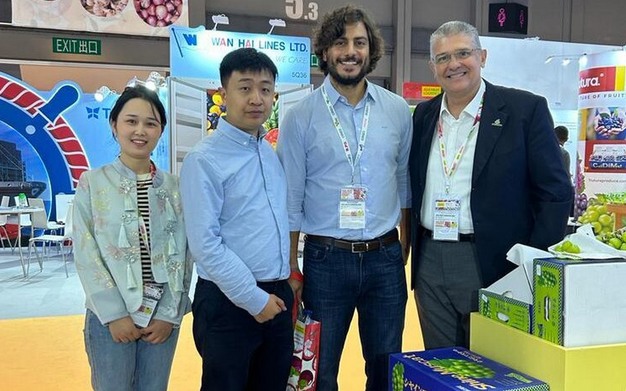Last week, the Brazilian Association of Producers and Exporters of Fruit and Derivatives (Abrafrutas) participated in Asia Fruit Logistica, one of the largest fresh and agricultural products fairs in Asia, which brought together the main players from the entire global fresh value chain in Hong Kong.
Ten Brazilian fruit exporting companies participating in the Frutas do Brasil sectoral project, an Abrafrutas internationalization project in partnership with ApexBrasil (Brazilian Export and Investment Promotion Agency), were present at the fair, which serves as a valuable platform to promote the Brazilian products in an expanding Asian market.
Brazil's participation in Asia Fruit Logistica is a reflection of the country's growing interest and importance in the global fruit and agricultural products industry. To give you an idea of this dimension, Brazil currently exports around 30.2 thousand tons of fruit to the Middle East, with apples being the most exported fruit to these countries located in Western Asia, with shipments of 26.5 thousand tons. .
At Asia Fruit Logistica, Brazilian fruit growing representatives had the opportunity to establish commercial contacts, find distributors, importers and other business partners. According to the president of Abrafrutas, Guilherme Coelho, Brazil's presence at the fair was an opportunity for the country to demonstrate its agricultural diversity and highlight the quality of the fruits produced in its territory. According to him, participation was very important, considering the growing appetite of Asian consumers for tropical fruits and healthy products, which are segments in which Brazil stands out.
“Brazil is recognized worldwide for the production of tropical fruits, such as mangoes, pineapples, bananas, and others, as well as temperate fruits, including apples, pears and grapes. This recognition is also due to the quality of the fruits and their differentiated flavor, which has made the world look at them and want to consume them,” stated the president.
Another important aspect is the promotion of good agricultural practices and the emphasis on sustainability in Brazilian fruit production. Many Asian consumers increasingly value the origin and sustainability of the products they consume, and Brazil has the opportunity to highlight its commitment to responsible production.
For more information: abrafrutas.org

